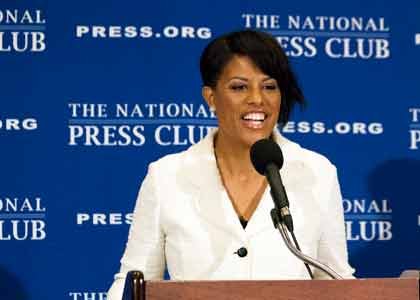(NNPA) — Special to the NNPA from The Washington Informer
When Baltimore native and Mayor Stephanie C. Rawlings-Blake, 45, stepped to the podium at D.C.’s historical National Press Club in Northwest, she looked poised, prepared and polished.
But make no mistake. She’s a lot more than just a “pretty face.”
In her own words, she’s been attending to the needs of her community, including being the youngest person ever elected to the Baltimore City Council (in 1995), and preparing herself as an attorney admitted to both the Maryland and federal bars, for as long as she can remember. She follows in the footsteps of her father, Howard “Pete” Rawlings, a former member of the Maryland House of Delegates.
The second woman to hold the office of mayor in Baltimore, Rawlings-Blake also serves as secretary of the Democratic National Committee [DNC] as well as president of the U.S. Conference of Mayors.
She spoke to members of the press and leaders of the District on Wednesday, Oct. 7 about the challenges facing her city, our nation and the DNC as America prepares to elect its next president.
“The country’s current view of Baltimore has been shaped by a few things: the excellent writing and acting in the HBO series ‘The Wire” and the two weeks in April following the death of Freddie Gray and the subsequent demonstrations and unrest,” she said. “[But] Baltimore is much more than just what was shown on the endless loops on some of our national media.”
Rawlings-Blake, who ran for and won as City Council president in 2007, found herself ascending to the mayor’s post for the balance of the former chief’s term when then-Mayor Sheila Dixon, following her conviction for embezzlement, resigned from office in February 2010.
Rawlings-Blake went on to seek and secure a full term as mayor in 2011. Now, with another election on the horizon, she has decided that she will not seek re-election.
“I wanted to stay focused on the work at hand. But we’re not on vacation. With great examples like Boehner and Obama, you can go down the history of people who have been where I am – leaders who served until the end of their term – who have been unfiltered, unchained and unrestricted,” she said.
“I have the benefit of every single thing I do not being viewed through the lens of campaigning or politics,” added Rawlings-Blake who said resolutely that she would not let politics stand in the way of progress. “There’s more than a year left on my term and every single day we will be pushing for progress for Baltimore’s families.”
The mayor addressed topics that included: police-community relations; her decision to hold public safety forums throughout the city in order to hear from the citizens of Baltimore; the invitation that she extended to the Department of Justice COPS program so that they could conduct a collaborative review of the City’s police department; and the unrest that has long plagued the city in which she was born and raised.
“When I’ve spoken to mayors across the country, virtually all of them have the sobering sense that what happened in Baltimore could have happened in their city as well,” she said. “[We] were not as prepared as we should have been and certainly could have been for the unrest.”
“The unrest in Baltimore and the aftermath points to deeper underlying issues: lack of jobs; challenges with housing and education; and disparities in opportunity. If we are to succeed in preventing future unrest, we must attack these underlying issues. None of this was created overnight and it won’t be solved overnight.”
“We know that far too many people have been left out of the recovery since the great recession. Gridlock strangles Washington and the consequences of that gridlock – they’re passed on to cities, that’s passed on to mayors,” she said.
Rawlings-Blake recently met with other mayors in Baltimore in order to define their priorities that they will soon pass on to presidential candidates, Republican and Democrat alike.
The “Mayors Compact for a Better America, she noted, now under final editing for the “exact wording of the document,” will present critical areas that the mayors, after reaching consensus, have identified and want to see included as both part of the national campaign and the national conversation.
She added that while she’s often asked what she intends to do after her term ends, she really doesn’t have an answer yet.
“There’s hope now that something better is coming for those neighborhoods long ignored and abandoned,” she said. “It is important work to bring hope to our communities. When we do that we focus on making sure that government does what it’s supposed to do for the citizens that we serve.”
